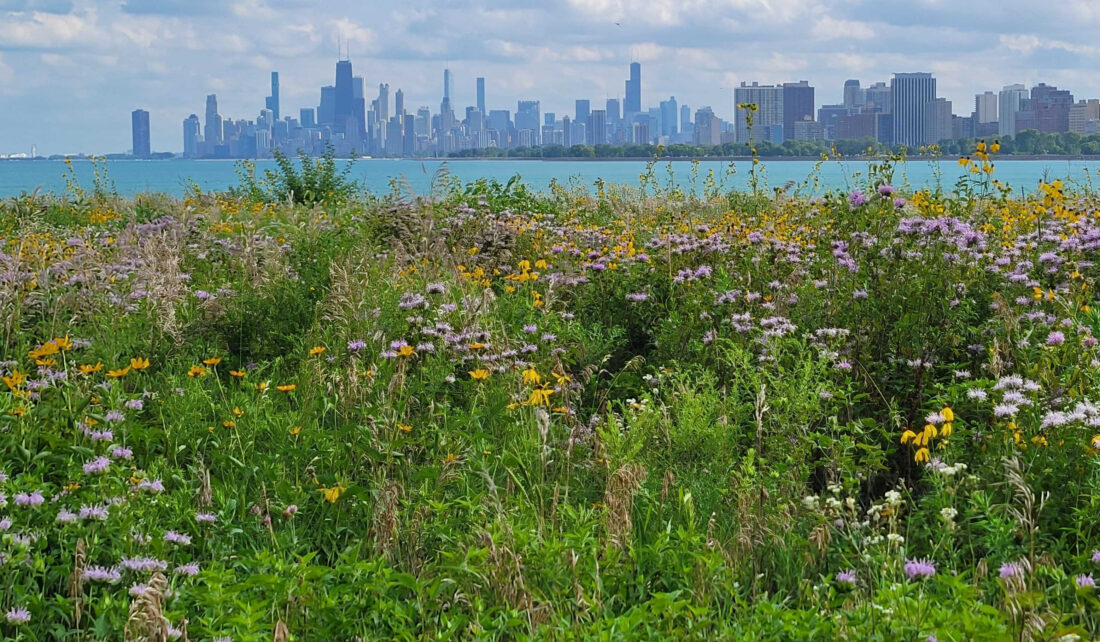
At the recent Sea Grant Week, a national meeting that was held in Savannah, Georgia, several Illinois-Indiana Sea Grant (IISG) projects were featured as part of a research overview. One of these studies brought middle school-aged children into a University of Illinois Chicago laboratory to help in the quest for new sources of antibiotics. These youth learned about STEM (science-technology-engineering-mathematics) from a new and exciting perspective and their work led to the discovery of a new compound that has shown activity against cancer.
Now, we are committing $890,000 of funding for five new two-year research projects. These studies will inform decision-making for some of the region’s pressing coastal issues including: the prevalence of contaminants (especially PFAS) in southern Lake Michigan waterways; vulnerable shorelines, specifically, the impact of two artificial reefs in nearshore waters along northern Illinois; and planning for a sustainable water supply in the south suburbs of Chicago. Researchers represent the University of Notre Dame, Illinois Institute of Technology, and University of Illinois’ Prairie Research Institute.
In other funding news, IISG and Northwestern University were awarded $2.48 million from NOAA to support research to develop efficient, scalable, and cost-effective technologies for characterizing and preventing microplastic pollution as well as removing microplastics from aquatic ecosystems.
Furthering aquaculture outreach, the National Sea Grant Office has awarded $750,000 to Great Lakes Sea Grant programs to continue the work of the Great Lakes Aquaculture Collaborative. Project objectives include increasing the public’s aquaculture literacy and co-creating a Great Lakes seafood brand to highlight locally raised seafood.
We have some personnel updates, too. As our new buoy specialist, Les Warren will keep the buoys in tip-top shape, deploying and retrieving them each year and engaging in related outreach. Les splits his time in Purdue’s Department of Forestry and Natural Resources engaging in educational activities and supporting aquatic ecology research.
Our new stormwater outreach associate is Madelyn Craft. A recent University of Illinois graduate with a degree in sustainable design and the volunteer coordinator for the Red Oak Rain Garden, Maddy will work closely with the stormwater team, helping to develop, deliver, and evaluate a USDA-funded green infrastructure maintenance curriculum.
Dominique Turney, who serves as our Great Lakes science liaison, has now added fisheries outreach to her IISG duties. She is continuing our longstanding workshops that connect fishers in the greater Chicago area and beyond with the latest Lake Michigan fisheries research and news. The next in-person event will take place on November 6 in Portage, Indiana and the virtual version will be on November 14.
Other upcoming events include:
- The final stop of the Aquaculture Field Day tour focused on avian predator management will take place on October 5 at the Michigan Wholesale Walleye Farm. At this free half-day event, researchers from Kansas State University and Lake Superior State University will share the results of their study evaluating laser and acoustic technologies as bird deterrents.
- The aquatic invasive species team will join IISG educators to host an exhibit booth at the Illinois Science Teaching Association annual conference on October 14 to introduce The Crayfish Curriculum. IISG educators will also lead a session on The Watershed Game, a hands-on team activity that helps students understand community relationships between water quality and land uses.
Finally, I’d like to share a happy ending to the work of one of my previous graduate students. After much delay, Marissa Cubbage, who was co-advised by IISG’s Paris Collingsworth, will share her research results in early October with the audience that matters most in this case, the Little Traverse Bay Band of Odawa Indians who have a historical and cultural relationship with the fish she studied: lake whitefish and cisco. She will describe the diet and availability of food for these larval fish in beach environments along northern Lake Michigan.

